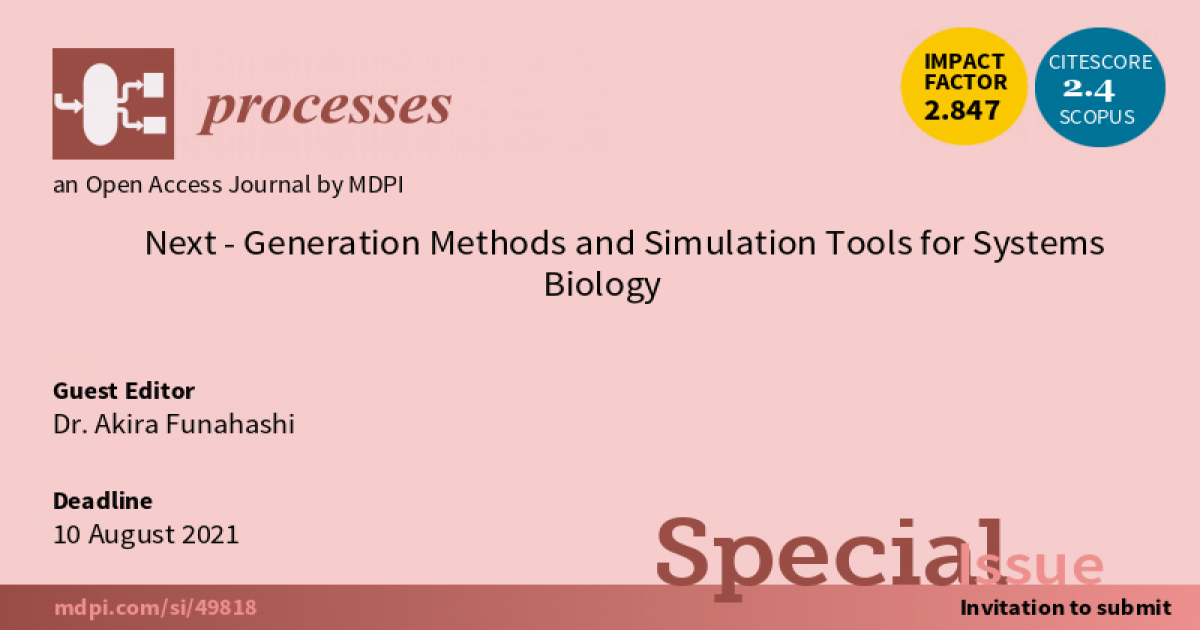- 2.8Impact Factor
- 5.5CiteScore
- 15 daysTime to First Decision
Next-Generation Methods and Simulation Tools for Systems Biology
This special issue belongs to the section “Biological Processes and Systems“.
Special Issue Information
Dear Colleagues,
Ever since Isaac Newton compiled the laws of motion, mathematical modeling and model-based simulations have always facilitated our understanding of natural phenomena. This concept has also been applied to biology, creating a field called Systems Biology. Advances in data collection techniques such as next-generation sequencers and high-throughput imaging with microscopy have enabled advanced modeling in biology, i.e., spatial modeling and whole-cell modeling. Currently, new simulation and analysis methods for such models need to be proposed in order to reach deeper insights into natural phenomena.
This Special Issue focuses on various methods (i.e., large-scale modeling, spatial modeling, image processing, and deep learning) to provide both fundamental and applied analytical methods and simulation tools to extract critical information from large amounts of data in the field of Systems Biology.
Dr. Akira Funahashi
Guest Editor
Manuscript Submission Information
Manuscripts should be submitted online at www.mdpi.com by registering and logging in to this website. Once you are registered, click here to go to the submission form. Manuscripts can be submitted until the deadline. All submissions that pass pre-check are peer-reviewed. Accepted papers will be published continuously in the journal (as soon as accepted) and will be listed together on the special issue website. Research articles, review articles as well as short communications are invited. For planned papers, a title and short abstract (about 250 words) can be sent to the Editorial Office for assessment.
Submitted manuscripts should not have been published previously, nor be under consideration for publication elsewhere (except conference proceedings papers). All manuscripts are thoroughly refereed through a single-blind peer-review process. A guide for authors and other relevant information for submission of manuscripts is available on the Instructions for Authors page. Processes is an international peer-reviewed open access semimonthly journal published by MDPI.
Please visit the Instructions for Authors page before submitting a manuscript. The Article Processing Charge (APC) for publication in this open access journal is 2400 CHF (Swiss Francs). Submitted papers should be well formatted and use good English. Authors may use MDPI's English editing service prior to publication or during author revisions.
Keywords
- ODE model
- Stochastic model
- Boolean model
- Spatial model
- Numerical calculation
- Parameter estimation
- Bifurcation analysis
- Image processing
- Machine learning

Benefits of Publishing in a Special Issue
- Ease of navigation: Grouping papers by topic helps scholars navigate broad scope journals more efficiently.
- Greater discoverability: Special Issues support the reach and impact of scientific research. Articles in Special Issues are more discoverable and cited more frequently.
- Expansion of research network: Special Issues facilitate connections among authors, fostering scientific collaborations.
- External promotion: Articles in Special Issues are often promoted through the journal's social media, increasing their visibility.
- Reprint: MDPI Books provides the opportunity to republish successful Special Issues in book format, both online and in print.


